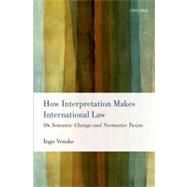
Note: Supplemental materials are not guaranteed with Rental or Used book purchases.
Purchase Benefits
Looking to rent a book? Rent How Interpretation Makes International Law On Semantic Change and Normative Twists [ISBN: 9780199657674] for the semester, quarter, and short term or search our site for other textbooks by Venzke, Ingo. Renting a textbook can save you up to 90% from the cost of buying.
| Table of Cases | p. xi |
| List of Abbreviations | p. xvii |
| In the Beginning was the Deed | p. 1 |
| Problématique | p. 2 |
| Agenda | p. 10 |
| Programme | p. 14 |
| The Practice of Interpretation: A Theoretical Perspective | p. 16 |
| Lawmaking in communicative practice | p. 18 |
| On the sources of international law | p. 19 |
| Sovereignty, sources, and semantic change | p. 27 |
| From sources to communicative practice | p. 29 |
| Semantic struggles in the practice of legal interpretation | p. 37 |
| Practice between agency and structure | p. 38 |
| On the form and substance of legal interpretation | p. 46 |
| Power and authority in semantic struggles | p. 57 |
| Actors in the practice of interpretation | p. 64 |
| Private norm entrepreneurs | p. 65 |
| The disaggregated state | p. 67 |
| International institutions: Bureaucracies and judicial bodies | p. 69 |
| UNHCR and the Making of Refugee Law | p. 72 |
| International bureaucracies as actors in legal discourse | p. 76 |
| Delegation from principals to agents | p. 77 |
| The authority of international bureaucracies | p. 82 |
| The expansion of UNHCR's Statute | p. 87 |
| Expectations and concerns | p. 90 |
| International protection and humble beginnings | p. 95 |
| Material assistance, good offices, and displaced persons | p. 98 |
| Humanitarian aid and voluntary repatriation | p. 104 |
| UNHCR and the meaning of the Convention | p. 109 |
| UNHCR's role in developing the Convention | p. 110 |
| Semantic change at work: Shifting elements in the meaning of 'refugee' | p. 122 |
| Conclusions: Change and contexts | p. 130 |
| Adjudication in the GATT/WTO: Making General Exceptions in Trade Law | p. 135 |
| International adjudicators as actors in legal discourse | p. 139 |
| Historiography: Longing for international adjudication | p. 140 |
| Judicial decisions and precedents | p. 144 |
| The GATT/WTO context | p. 147 |
| Article XX in the era of the GATT | p. 150 |
| General exceptions: A general prologue | p. 150 |
| The creation of a high threshold | p. 157 |
| A territorial limitation? | p. 163 |
| Article XX in the era of the WTO | p. 167 |
| Institutional changes and the working of precedents | p. 167 |
| A new beginning with the Appellate Body | p. 172 |
| Proportionality, interpretation, and legitimacy | p. 180 |
| Conclusions: Adjudication, precedents, and legitimacy | p. 190 |
| Creative Interpretations: Normative Twists | p. 196 |
| The bittersweet taste of justice in legal discourse | p. 198 |
| Narratives of progress and advents of justice | p. 200 |
| Scepticism and realism | p. 207 |
| The practice of interpretation and communicative action | p. 214 |
| The centrality of law: Dissonances and developments in legal doctrine | p. 223 |
| The appeal and futility of soft law | p. 225 |
| Intertemporal law and subsequent practice: shortening the leash? | p. 230 |
| Global administrative law and international public authority | p. 240 |
| Evasive foundations: Semantic authority in a normative pluriverse | p. 245 |
| Principles of democracy and ultimate authority | p. 248 |
| Architectural renovation and institutional design | p. 252 |
| Attitudes and interpretation at critical junctures | p. 256 |
| Epilogue: In the End there is Eternity | p. 262 |
| Bibliography | p. 266 |
| Index | p. 313 |
| Table of Contents provided by Ingram. All Rights Reserved. |
The New copy of this book will include any supplemental materials advertised. Please check the title of the book to determine if it should include any access cards, study guides, lab manuals, CDs, etc.
The Used, Rental and eBook copies of this book are not guaranteed to include any supplemental materials. Typically, only the book itself is included. This is true even if the title states it includes any access cards, study guides, lab manuals, CDs, etc.